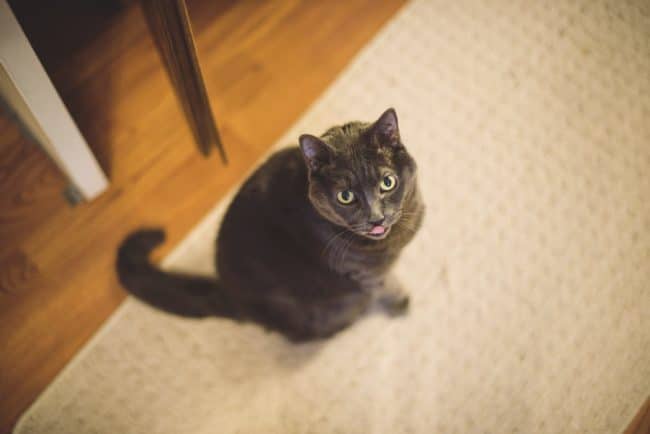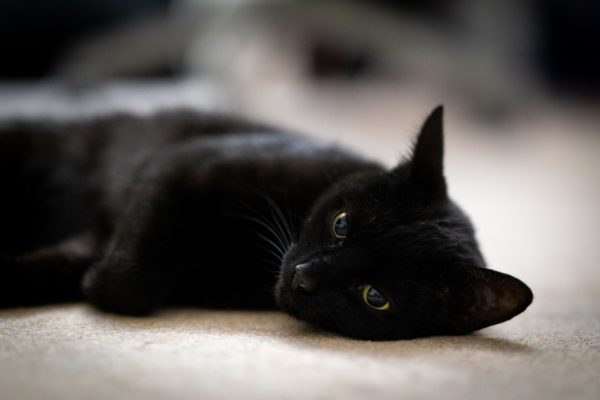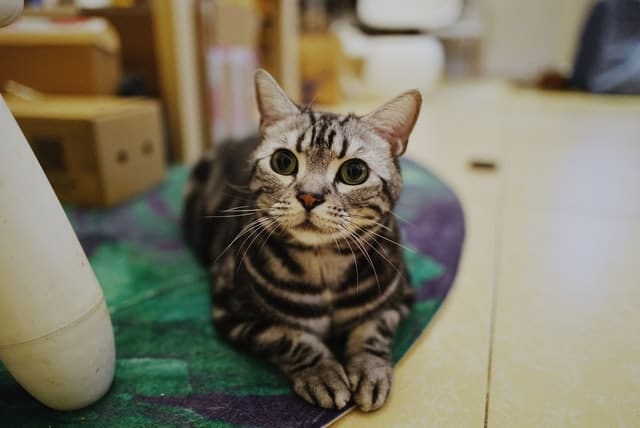Cats would eat anything that contains meat and are notorious stealers. Under these circumstances, it is natural to ask yourself: ‘Can cats eat Vienna sausage?’
When your feline is fed cat food for sensitive stomach, you have one extra reason to worry about such treats.
So Can Cats Eat Vienna Sausage?
This could never happen to me, you think. And you are probably right.
Vienna sausages are not exactly what you would expect a responsible cat owner to give their pet. However, there are situations when your best friend may eat foods that are not suitable for its stomach.
The first reason to ask yourself ‘Is Vienna sausage bad for cats?’ is having a little thief at home. While many cat owners try hard to get rid of this habit, it is almost impossible. Stealing food usually occurs when you leave food unattended. This happens because cats are natural predators and are food-motivated. Especially if the cat is hungry, the aroma of meat is very hard to resist.
There are several things you can do to prevent the cat from stealing. It is important to feed it regularly. Secondly, clean leftovers immediately. Also, make sure you positively reinforce the cat when he or she eats when supposed to eat.
Accidental ingestion of human food such as Vienna sausages can also happen if your cat scavenges leftovers. Some people offer their leftovers to cats, without realizing that some of the ingredients can be harmful.
Last, there are moments when you may be out of cat food. When the only meat you have at home is Vienna sausages, you may wonder if you can offer it to your cat. It’s also possible for the cat to beg or to ask for sausages as a treat.
Should you keep a close eye on the cat or should you just not worry too much?
What are Vienna sausages?

Vienna sausages can be different foods, depending on where you buy them.
In Europe, they are made from spiced ham and resemble the hot dog we are accustomed to in the US.
In the US, Vienna sausages are made from pork paste, sometimes combined with other meats.
Both versions contain spices and preservatives, which are generally not recommended to pets. What differs for each of the two versions are the taste and the shape.
What’s in Vienna sausages?
The first ingredient in Vienna sausages is meat, which should be absolutely fine for cats and other carnivores.
The problem is that besides meat, Vienna sausages can also contain other ingredients, some of them not suitable for pets:
- Processed meat
Meat is a suitable food for cats, but meat found in Vienna sausages is processed. Which means it differs from the meat your cat would be eating in the wild by catching prey.
- Spices
Not all spices are created the same. Some are beneficial to cats, while others are downright harmful. Cat food for sensitive stomach will usually not contain any spice at all.
However, if you do offer your cat spiced food, you should know what spices are allowed. The list of accepted spices includes valerian, licorice root, echinacea, cat’s claw, goldenseal, calendula, and catnip. Herbs usually consumed by humans are also allowed, such as basil, thyme, rosemary, dill, and coriander.
Avoid the following spices: garlic (often found in sausages!), onions, chamomile, mint, oregano, tarragon, and lemongrass.
- Salt
Salt is necessary to your cat in low amounts and it helps its body to function properly. A medium sized cat needs around 21 milligrams of salt per day. Too much salt can cause symptoms such as vomiting, diarrhea, seizures, excessive thirst, and walking drunkenly. Excess salt unbalance pets’ electrolytes, so avoid foods containing too much salt.
- Sugar
Sugar is added to human food to make it tastier. While sugar is not toxic to cats, it does not provide benefits either.
Surprisingly, cats cannot even taste sugar properly because they have fewer taste buds compared to dogs and humans. So, they will not even realize how much sugar they are ingesting.
Cats should eat just a small amount of carbohydrates. Moreover, they are not able to digest sugar efficiently. Symptoms of excessive sugar ingestion include discomfort, vomiting, and diarrhea.
- Additives and preservatives
These ingredients are not healthy neither for humans nor for pets. There are serious safety issues related to a variety of food additives, even if they are not prohibited. A diet as natural as possible is recommended both for you and your furry friend.
Why Vienna sausages can be harmful to cats

Does all this mean that sausages are bad for cats?
If Vienna sausages contained just unprocessed meat, they would be ideal for cats.
However, the situation is different because these products contain other ingredients as well:
- Salty, sugar, and spices – to make them tastier for humans;
- Additives and preservatives – to make them more appetizing and to ensure a longer shelf life.
Feeding your cat Vienna sausages can cause a variety of unpleasant digestive symptoms, such as discomfort, vomiting, diarrhea, etc.
The best is to read the label of the product and look for harmful ingredients. But since the large majority of sausages contain ingredients unsuitable to cats, it’s better to stick with pet food.
Are sausages in general suitable for feeding cats?
The answer is no.
Even if your cat begs for sausages and other treats, don’t give in.
A small quantity now and then may not have a negative impact.
But if you regularly feed your cat sausages, you can cause problems such as thiamine deficiency.
This is because some foods for humans and even pet foods may contain sulphur dioxide and potassium sulphite preservatives. These substances can cause thiamine (vitamin B1) deficiency, which has the potential to be fatal in cats.
Other preservatives such as sodium benzoate, often used in products for human consumption, is not tolerated by cats. Certain doses of this preservative can even be toxic.
Can cats eat uncooked sausages?
Uncooked sausage is also not recommended for cats due to the risk of Salmonella poisoning. Symptoms of Salmonella infection are:
- Lack of appetite;
- Vomiting;
- High fever;
- Abdominal pain;
- Diarrhea;
Complications of the Salmonella infection include septicemia and endotoxemia. In some cases, the infection can spread to various organs and cause meningitis, pneumonia, and abortion.
Raw sausage can contain more toxins and bacteria than a cooked one. Bacteria can make cats sick, with kittens being severely affected.
The reason why you should avoid feeding kittens inappropriate food is their under-developed immune system. The toxins and bacteria found in certain foods can make a kitten a lot sicker than an adult.
Healthy alternatives to sausages
Giving small amounts of cooked sausage every once in a while is not a problem. However, there are healthier options available.
If your cat seems to like this human food very much, you can try sausage cat food or sausage-flavored treats.
Every time you are in doubt about giving a treat to your cat, remember what is the cat’s ideal diet:
- Animal-based proteins and fat (52%, respectively 36% of their diet);
- Very small amounts of carbohydrates;
- Cooked meat for human consumption offered as occasional treats;
- Wet food as it is a superior option to dry kibble.
Other foods you shouldn’t feed your cat

Cats would eat anything if it has an interesting flavor, but this doesn’t mean you should allow it. Here are the most dangerous foods you must keep your cat away from:
- Chocolate
Keep it out of cat’s reach because it contains theobromine, a substance that is toxic to pets.
- Dairy products
Cats happily drinking milk are everywhere in popular culture: pictures, children’s books, and films. The fact is cats become lactose intolerant after weaning. Dairy products will most likely give your cat or kitten an upset tummy.
- Tuna
Eating too much tuna can cause malnutrition because this food lacks the nutrients needed by cats. Also, larger quantities of tuna can lead to mercury poisoning.
- Onions
Onions in any form, from raw to powder and cooked, are toxic to cats and dogs and will cause anemia. Garlic is even more powerful and can cause life-threatening conditions.
- Alcohol
As much fun as it seems to give you cat alcohol, don’t do it. A few teaspoons of alcohol can kill a small cat.
- Grapes and raisins
For a reason that is largely unknown, these fruit cause kidney failure in cats. Even a small amount can cause severe symptoms. Look for symptoms such as vomiting and hyperactivity if you suspect your cat has ingested grapes.
- Caffeine
Found in coffee as well as in common medicines and beverages, caffeine is lethal to cats in larger quantities. Unfortunately, there is no antidote.
- Fat
Fat trimmed from meat and bones is often found in leftovers that cats end up eating. Even if fat is part of a cat’s diet, this particular source of fat is not recommended. It will usually cause digestive upset to your pet.
- Dog food
Both dogs and cats are carnivores, so dog food should be fine for cats, too, right?
The answer is actually no. while an occasional bite won’t hurt, dog food is not formulated for cat’s needs. Cats require more protein and certain vitamins and fatty acids.
Dogs, on the other hand, can be omnivores. Dog food may contain too little animal protein and too many carbohydrates and vegetables for a cat. This can cause malnourishment in your cat.
Read Also: Can Dogs Eat Jicama
To sump up: cats eat Vienna sausage?
The answer is yes, but in limited quantities and just as a special treat. And making sure they don’t contain harmful ingredients.
Furthermore, raw sausages pose more risks due to potential bacteria present in the meat. Eating sausages may only cause an upset stomach, but a Salmonella infection can represent a much bigger problem.
In conclusion, why risk when there are so many healthy food options? From hunting small animals to cat food for sensitive stomach, there is always a better option than Vienna sausages.
